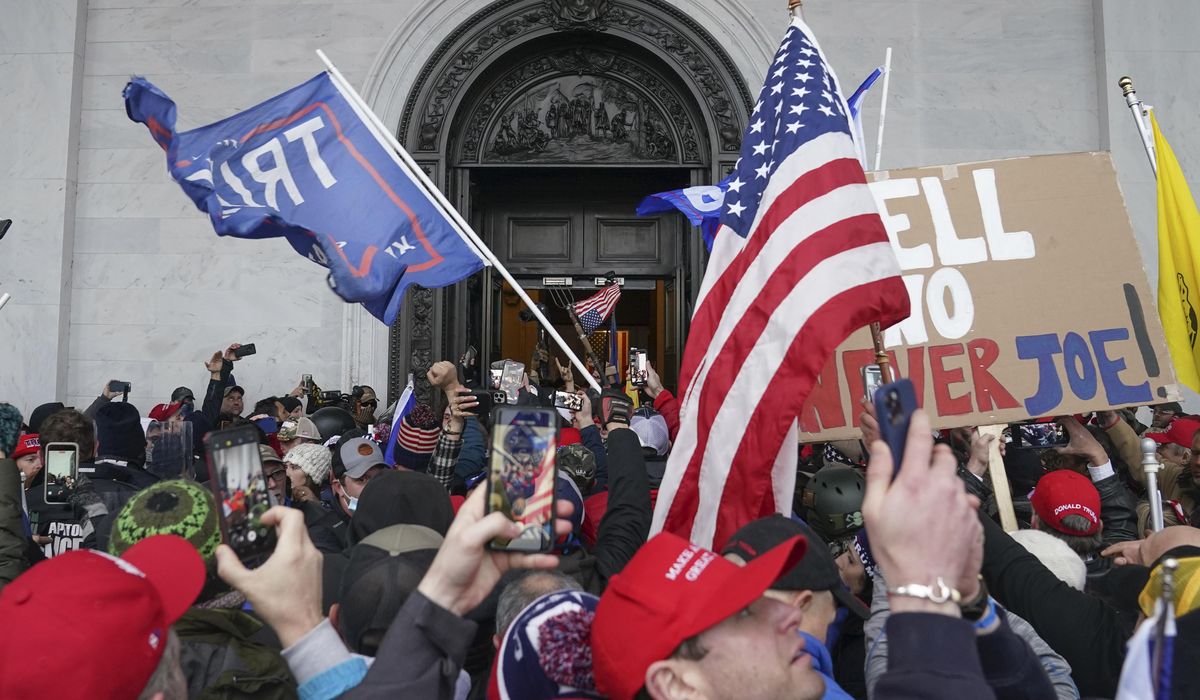
OPINION:
The Department of Justice likes to remind us occasionally that, since Jan. 6, 2021, more than 725 people have been arrested for crimes related to the events of that day. More than 165 individuals have pleaded guilty to federal charges. Many fewer (22) have pled to felony offenses. None has gone to trial. Sentences have ranged from probation to jail terms denominated in months.
As we have noted before, no one has been charged with treason or insurrection. Under pressure to do something that at least sounded material, the Department of Justice recently charged a handful of folks with seditious conspiracy. That sounds pretty bad. Is it?
Well, here’s how the U.S. Code describes sedition: “If two or more persons … conspire to … by force to prevent, hinder, or delay the execution of any law of the United States, or by force to seize, take, or possess any property of the United States contrary to the authority thereof …”
It doesn’t seem like that provision — no doubt the one prosecutors will use in court — meets anyone’s definition of “insurrection.” It reads more like a federal version of obstruction of justice or resisting arrest.
Notably, the prosecutors have not charged anyone with insurrection, which is defined in Title 18, Section 2383 of the U.S. Code as: “Whoever incites, sets on foot, assists, or engages in any rebellion or insurrection against the authority of the United States or the laws thereof, or gives aid or comfort thereto.”
I mention all this because the minority leader in the U.S. Senate, whom I greatly admire, recently said: “Jan. 6 was a violent insurrection.”
As an officer of the court, Sen. Mitch McConnell, Kentucky Republican, should know better. No one has been found guilty of insurrection. No one has even been charged with it. Moreover, the Capitol police obviously didn’t think the situation was that violent: There were no gunshots fired (by either the police or the protesters) except for those that killed Ashli Babbitt.
Mr. McConnell graduated from the University of Kentucky College of Law in 1967 and was president of the Student Bar Association. He’s a lawyer, an officer of the court, and an elected official who has taken multiple oaths to defend the Constitution, including all that “due process” language. His public statements about matters of possible criminal behavior should be more measured and grounded in facts.
Even the DOJ ends all its press releases on this topic with the admonishment: “An indictment or complaint is merely an allegation, and all defendants are presumed innocent until proven guilty beyond a reasonable doubt in a court of law.”
This need for precision and grounding statements in facts is not merely a question of debating etiquette. Some intend to use the events of Jan. 6, 2021, to disqualify potential candidates from running for office.
In North Carolina, the Board of Elections is seeking to remove Republican Rep. Madison Cawthorn from the ballot because of a speech he gave that day.
In a court filing, election board members argued that they can remove Mr. Cawthorn under Section 3 of the 14th Amendment, precluding candidates who “engaged in insurrection or rebellion” against the United States. Leaving aside trials, juries, evidence, assumption of innocence, etc., the filing asserted: “The state has the authority to police which candidates should or should not be disqualified per section 3 of the 14th Amendment.”
In Indiana, a potential challenger to GOP Rep. Jim Banks has filed a petition to remove Mr. Banks from the ballot because of a vote he took on Jan. 6, 2021. The petition explicitly mentions Section 3 of the 14th Amendment.
Letting bureaucrats decide who gets to run for office — especially without any legitimate process — based on a speech or a vote is a very bad idea that will, of course, eventually go both ways. Remember, a handful of Democrats voted against certifying the election results in 2016.
We live in dangerous times, so clarity and precision in both speech and thought are essential.
The Jan. 6 protesters were wrong about the law governing the ability of Congress or the vice president to alter the results of the 2020 presidential election. The results of that election did not trigger any constitutional provision permitting Congress to intervene in the result. The protest exceeded lawful bounds, and individuals should be held legally accountable.
But it was not an insurrection, and until courts of competent jurisdiction say otherwise, we should be careful with our language.
Worrying about the past is a sucker’s game and at odds with the American character. This nation, fortunately, has been built by people — from the voyagers on the Mayflower to the ridiculously rich kids in Silicon Valley — who look forward.
Living in the past is a mistake. So is being wrong about what happened in the past.
• Michael McKenna, a columnist for The Washington Times, is a co-host of “The Unregulated” podcast. He was most recently a deputy assistant to the president and deputy director of the Office of Legislative Affairs at the White House.








